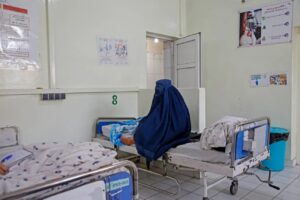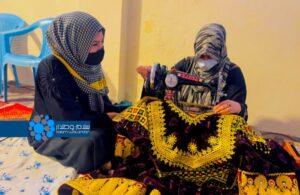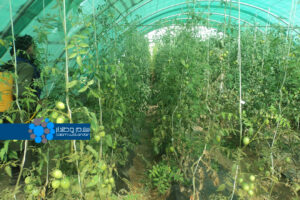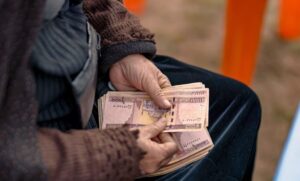KABUL (SW) – Despite years of relative progress on women rights and healthcare fronts, a number of female nomads told Salam Watandar they have been deprived of the very basic health services across Afghanistan.
Poverty, lack of access to education and health services, and early marriage are the common problems of every nomadic woman in Afghanistan.
In this report, 17 nomadic women who have just come from Nangarhar to Kabul have been interviewed and all of them complained of economic, health and mental problems and each of these women were married under age.
On the other hand, not having the right to choose, the right to express an opinion is another deprivation of these women, who are not even familiar with these rights. Besides that, living with several small families or living with the husband’s second wife in a tent is another issues faced by these women.
Shahpirai says, “I have five daughters and three sons. Life is very hard. We all sleep in the same tent, boys and girls together, along with other families. We dream of having a proper house where we can be comfortable and study. The birth takes place at home, and my children come one after another. When I don’t give birth to children, my husband marries another woman because he says we don’t have enough sons.”
Spozhmai, another nomad woman who spoke with Salam Watandar, said, “”I have one child. It has been a long time since I got married. I didn’t have any children, and because of that, my husband married another woman; my life was like this. No one asked me when they gave me in marriage and My father made the decision. I didn’t know, I didn’t study, and I don’t know how to pray or read the Holy Quran.”
“Until now, there is one tent and we all live in the same tent together with 6 children and the other wife of my husband. My real mother has passed away and I have another mother. I suffered a lot there and also, thanks to the current life, I have at least children. In short, the life we have, may God not give it to anyone’s enemy.”
Forgetting the paternal family is one of the other compulsions of every nomad woman interviewed in this report. These women say that according to their traditions, women should forget their paternal family after marriage and not have any relations with them.
Jamala, “I don’t know about my daughters, our men give them in marriage, and I don’t know about my daughters who got married. It is even more cruel. I don’t know about them from the day they got married, and we have a hard life.”
Riza Gul, “I have 3 daughters-in-laws, my daughters got married but when we gave them in the marriage, they were not asked. Now life is not good and they are being oppressed. They have not come from the day they got married, and I don’t know about them.”
“In general, our people, if they have money, still live in tents and are always on the move,” said Zarmina, another nomad woman. “I have many problems. I am also sick. I don’t know about my mother’s condition for years, and they don’t know about me either.”
As two nomadic women, Maimuna and Shamina, said, for many of them, the outdated cultures and hard lifestyle are the root causes of their miseries that they want to address dearly.
“I got married at the age of 15, my child was born at the age of 16, our children do not go to school, they work. I would be happy if our children go to school and live in a good home. I am not in a good mood, I am in pain all the time because of my early marriage” siad Maimuna.
“I have 9 children, two daughters, and now I have two daughters-in-laws. She went to her father’s house last Eid, and I don’t go there; if possible, she will go there in the coming year. The bride has two children, they have been born one after the other. The day she got pregnant, she has been doing housework until the birth of her child, and I worked on her. After the birth, she rested for three days. Later, she started all the housework, and she does all the work,” said Shamina.
The nomads in all the provinces prefer to settle on plains near mountains full of grass to feed their livestock, but this means they are faced with an array of difficulties in life such as lack of access to sanitary facilities, lack of education and on top of that early marriage are the common problems among all the nomadic women.
Mashal, a nomad, said that their cultures and customs are different from other people and they are happy living in tents. He said nomadic women are responsible for housework and other affairs, and girls are married immediately at puberty. Because Nomads live in remote areas, they do not have access to health services and do not visit doctors. “We marry our girls at the age of 15, and our custom is to marry among ourselves, not with strangers, and we, men, take care of animals and we take animals for grazing. When women get sick, we live in the remote plains and cannot go to doctors, and our children are mostly born at home.”
Gulbuddin, another nomad, also said: “Our popular custom is to get dowry money for girls, but if there is no money, we give sheep and other animals, and when the girls reach puberty, we get them married, and we men do outside work. We do not like to live in houses because we can’t live in locked closed places.”
A number of women’s rights activists say that the lack of health facilities and basic services has made the lives of nomadic women very difficult.
Women’s rights activist Foruzan Dawodzai says: “Because the nomads do not live in a certain place and mostly live in the plains and green areas, where there are no clinics, schools or even clean water, there is a need for mobile clinics for them and provide basic services.”
Ahmad Rashid Sediqi, a sociologist, states that a peaceful and prosperous life and basic services are the right of every member of the society, but the life of the nomads, especially women, is very difficult and they face many problems. He says: “Nomadic women do not have access to health and education services and if their situation is not addressed, the society will face a challenge.”
Sharafat Zaman Amarkhil, the spokesperson of the Ministry of Public Health, says that mobile clinics have been prepared to provide health services to all people, especially the nomads. He adds: “We have about 570 mobile clinics, and if they live in fixed locations, we will even build standard hospitals. But because of mobile life, we have provided mobile clinics for them.”
Mansoor Ahmad Hamza, the spokesperson of the Ministry of Education, says that the Ministry of Education is trying to provide the necessary educational facilities for all citizens. He adds: “Schools and dormitories have been prepared for the nomads, and even mobile schools have been built so that they can continue their education.”
Mohammad Halim Rafe, the spokesman of the National and Statistical Organization, states that the country’s population in the year 2023 was estimated at 34.9 million people, of which 1.5 million people (4.3 percent) are nomads. “According to the special conditions of the nomads, there are no separate centers for them to distribute tazkira (ID cards) and they can can get it in any province.”
The ‘Kochis’ (nomads) are one of the ethnic and social groups of Afghanistan that have a traditional and nomadic lifestyle. They make a living by animal husbandry and agriculture, and due to the mobile nature of their lives, they are constantly moving between different pastures. This way of life causes the nomads to be deprived of access to basic services such as health, education and clean drinking water.






